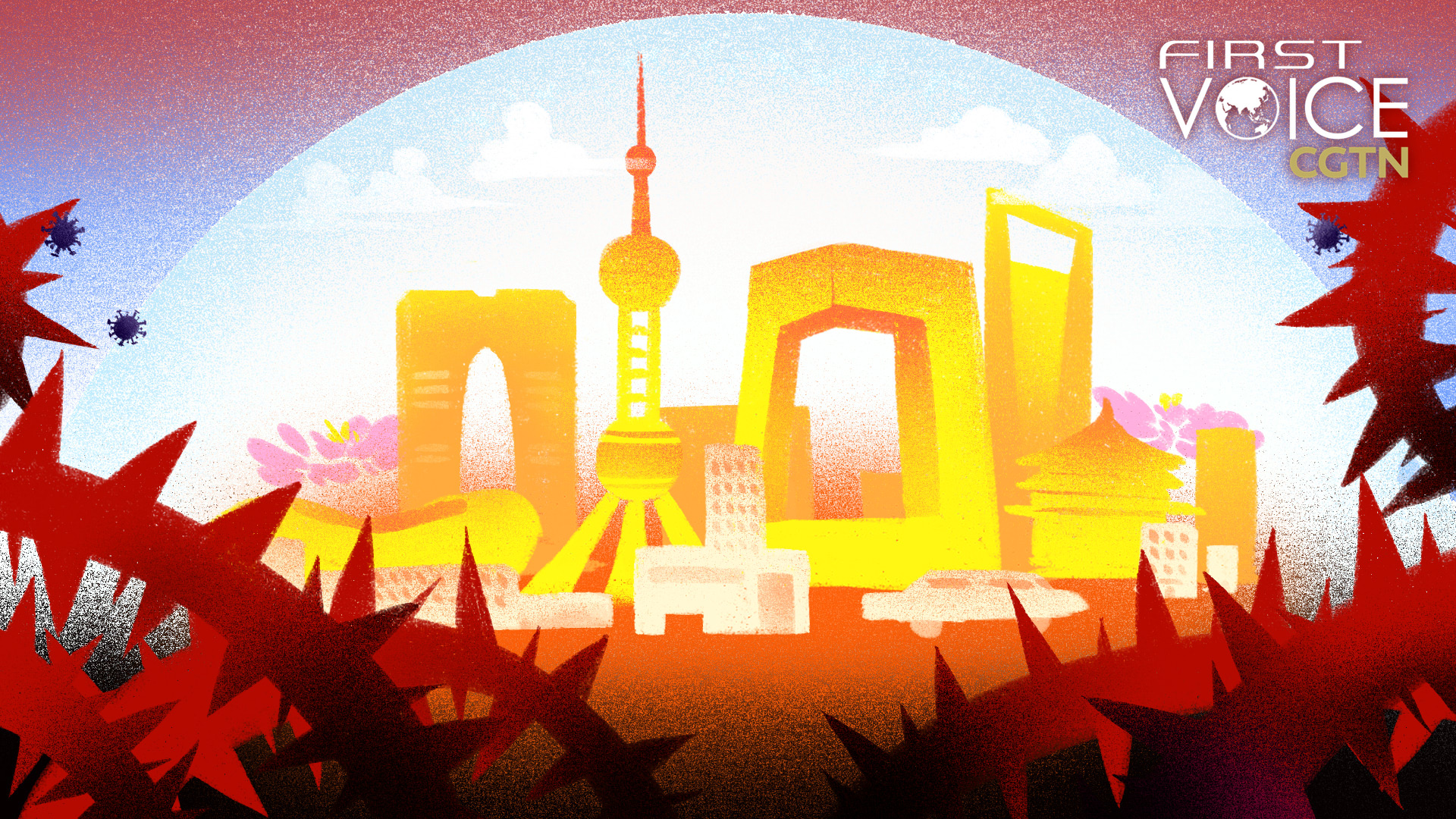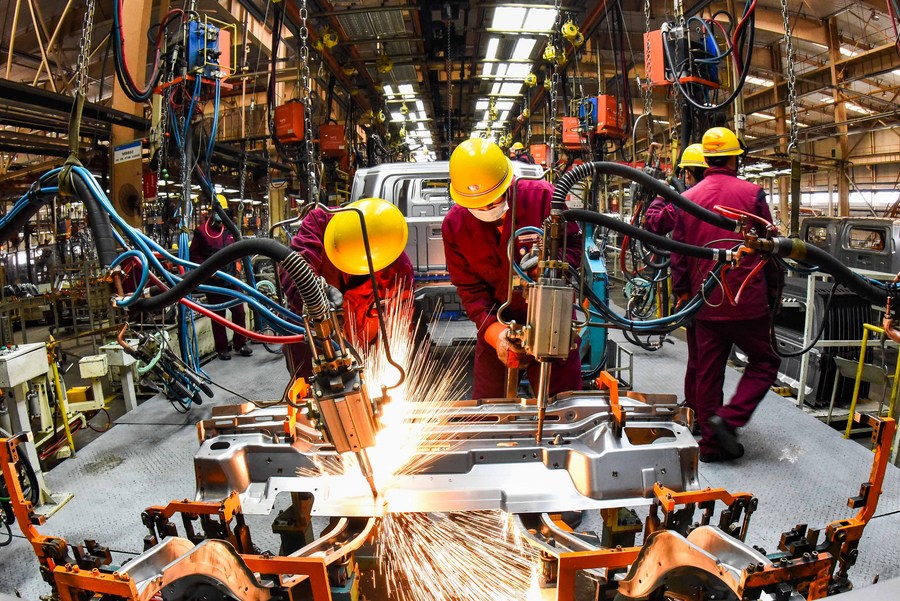
Editor's note: CGTN's First Voice provides instant commentary on breaking stories. The daily column clarifies emerging issues and better defines the news agenda, offering a Chinese perspective on the latest global events.
Western critics are criticizing China's zero-tolerance strategy toward COVID-19, saying it is likely to hurt China's economy and do more harm than good in 2022.
Undeniably, fourth quarter GDP growth was the weakest in a year and a half at 4.0 percent. The Chinese economy is facing downward pressures. However, China's current GDP of 8.1 percent is well above the global average. In contrast, the U.S. GDP in the third quarter was 2.1 percent. And the country remains focused on high-quality growth.
The income of Chinese people continues to rise, unemployment is well below the government's target level and exports are growing.
Despite the COVID-19 pandemic, official data shows China's foreign trade moved up another notch in 2021, exceeding $6 trillion for the first time, with exports up 21.2 percent year-on-year to 21.73 trillion yuan.
With its zero-tolerance policy toward COVID-19 in place, China's supply chain has shown strong resilience. This is why an increasing number of enterprises are returning to China. In December, China's commerce ministry reported a stable increase in the number of foreign-funded companies in the first 11 months of the year.
It's true that China's retail sales missed expectations, plunging to 1.7 percent year-on-year in December from 3.9 percent in November. But the government has many tools in its box to help nurture growth.
For example, in December, China cut its reserve requirement ratio by 50 basis points, with lots of scope for further reductions. The cut, the second such move of the year, would release 1.2 trillion yuan ($190 billion) in long-term liquidity, according to the People's Bank of China.
Also, China lowered its one-year loan prime rate in December and cut the rate of 700 billion yuan worth of one-year medium-term lending facility loans to financial institutions on Monday.
Both rates had not changed since April 2020.
It's clear that China has the macroeconomic and policy tools at its disposal to give the economy a boost.
It also has the regulatory tools to handle risks from the property market. People have been predicting the catastrophic collapse of a real estate bubble in China for many years.
Yet deft policy measures by the government have kept the property market from overheating. Predictions of a Lehman Brothers moment in China earlier this year have come to nothing.

Workers weld at a workshop of an automobile manufacturing enterprise in Qingzhou City, east China's Shandong Province, February 28, 2021. /Xinhua
Workers weld at a workshop of an automobile manufacturing enterprise in Qingzhou City, east China's Shandong Province, February 28, 2021. /Xinhua
But what about Western critics' charge that China's zero-tolerance policy toward COVID-19 will hamstring its economy?
This idea is completely backward.
Keeping COVID-19 at bay is exactly what has protected Chinese economic growth. Conversely, letting COVID-19 run wild was the mistake that crashed Western economies and even now prevents their recovery.
From the beginning, Western countries made the huge mistake of believing that fighting the COVID-19 pandemic meant hurting the economy. Two years after the former president of the United States lied to the public about the severity of the threat of COVID-19 for the narrow reason of helping his reelection prospects, much of the population is still fearful of going out in public.
More than 851,000 people have died in the U.S. and hospitalizations are at a record high, with hundreds or thousands succumbing to the disease each day.
Western politicians, beholden to business leaders with no responsibility beyond the next quarterly results, have continuously dragged their feet on fighting the coronavirus, hoping to keep short-term profits coming in.
Government leaders have been either unwilling or unable to take basic public health measures like contact tracing, and fear riots or even armed insurrection if they impose lockdowns on the public for its own safety.
Their hope from the beginning has been to let the pandemic burn itself out so the economy could go back to normal.
There was a major flaw with this plan though – the economy can't function properly if people are frightened to leave their homes.
The concept of "herd immunity" was just a distraction so governments could put corporate profits ahead of people's health.
This is the fundamental reason why macroeconomic tools in the West are on their own inadequate to fix the economy. People need to feel safe from COVID-19 before economic activity will return to normal.
The containment measures in Xi'an and Tianjin are generating large amounts of coverage in the West, coupled with dire predictions that China's strict epidemic control measures will hurt its economy.
However, Westerners fail to appreciate the size of China.
Locking down cities until infections are rooted out keeps the economy running.
China's economy will continue to grow because the country is pursuing high-quality development, staying committed to the reform and opening-up of its economy, and welcoming all types of capital into the country.
It is instructive to compare how China's economy has performed compared to the West over the past two years. In 2020, China was the only major nation to post economic growth, as a result of its strict and successful epidemic control measures in Wuhan and any other location where the virus was detected.
This year, its growth is still exceptional compared to the rest of the world. China has the right economic tools and the proper attitude toward controlling COVID-19 to ensure its economy will continue to be an engine for global growth.
For Western critics hyping an economic "downturn" in China, the correct way forward to fix the global economy is to remove barriers, not build walls.
(If you want to contribute and have specific expertise, please contact us at opinions@cgtn.com.)

